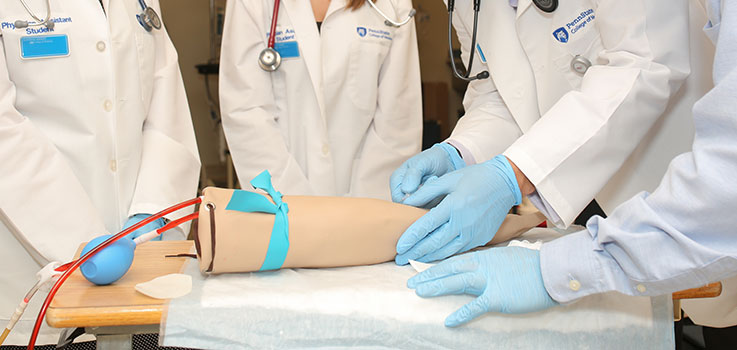Simulation Education Research Fund

The Simulation Education Research Fund (SERF) is supported by Penn State College of Medicine/Penn State Health Milton S. Hershey Medical Center Endowed Simulation Fund and managed by the Clinical Simulation Center.
The fund is designed to stimulate research in simulation-based education with an emphasis on developing innovative education programs targeting interdisciplinary/interprofessional collaboration and/or supporting young investigators.
The Simulation Education Research Fund will support simulation-based educational research in two separate application processes: Simulation-based Education Program Development and Implementation, and Travel Support for Academic Dissemination of Simulation-based Research.
Applications are accepted on a continuous basis and reviewed on a quarterly cycle. Email Ryan Shercliffe at rshercliffe@pennstatehealth.psu.edu with questions.
Jump to topic
Search
Simulation-based Education Program Development and Implementation
Up to four $2,500 grants will be awarded each year to support the development and implementation of simulation-based education programs. The program encourages and provides emphasis to applications that include interdisciplinary and/or interprofessional education programs.
This grant is open to students, staff and faculty of Penn State College of Medicine and Penn State Health Milton S. Hershey Medical Center, or anyone with an organization with a current affiliation agreement with Penn State College of Medicine.
With any SERF application in this category, the resources of the Clinical Simulation Center are available to support the applicant in areas such as research design, literature review and assessment, simulation or scenario creation, and other services.
This funding can be used for the following:
- Equipment, fabrication of new types of equipment or products, supplies, licensed survey instruments, and other materials essential to the development and implementation of the program.
- Specialty professional assistance such as statistician or psychometrician services.
- Open-access journal fees (up to $1,000) for publication of results.
- Other expenses related to the program such as employment of Standardized Patients, 3D printing services or software.
Applications for this funding will not pay for salaries or travel to meetings.
- Cover letter to include title, purpose, and goal (for students, include faculty mentor)
- Funding request as part of an overall detailed budget
- Project overview (limited to five pages) to include:
- problem/educational gap that will be addressed
- hypothesis or research question(s)
- rationale including significance and innovation
- specific aims that will be pursued/addressed
- educational or research strategy including timelines and milestones
- the nature of the contributions that will be made to the project by the primary investigator and co-investigators
- References (literature review)
- Resume or CV for all key personnel
- A brief letter from the applicant™s supervisor or Department Chair which confirms support of the effort (financial and/or space) required to perform the project
- A brief letter from all investigators stating their commitment to the project and assurance that they will perform the project in a timely and complete manner
Successful applicants for the Simulation-based Education Program Development and Implementation funding will be expected to update the Clinical Simulation Center Research Committee on progress on a quarterly basis or upon completion of the following milestones:
- IRB approval
- Initiation of enrollment
- Completion of enrollment
- Completion of data analysis (including statistics)
- All submissions and acceptances for academic dissemination including manuscripts, abstracts nd presentations
During this process, the Clinical Simulation Center is available to assist with all phases of the project development and dissemination process.
Successful applicants must also submit a brief final report detailing outcomes, publications and presentations, obstacles and barriers, and lessons learned as a result of this project.
Travel Support for Academic Dissemination of Simulation-based Research
Up to five $1,000 grants will be awarded to support employees, faculty, staff (including nursing and allied health) and volunteers of Penn State University College of Medicine, Milton S. Hershey Medical Center and organizations with current affiliation agreements that conduct programs in the Clinical Simulation Center in order to cover or partially offset expenses related to dissemination of simulation-based research findings at regional, national or international conferences.
This grant is open to students, staff and faculty of Penn State College of Medicine or Penn State Health Milton S. Hershey Medical Center.
Funding can be used for the following:
- Conference registration
- Transportation (air, rail, bus, or car)
- Lodging
- Meals (not to exceed daily University per diem rates; itemized receipts required, alcohol is excluded)
- Cover letter to include title of presentation, conference, date(s) and location
- Abstract as accepted by conference
- Copy of acceptance communication (email or letter)
- Proposed trip budget to include registration, transportation and lodging
Successful applicants to the Travel Support for Academic Dissemination of Simulation-based Research should submit receipts for payment (not to exceed $1,000).
General Overview: SERF Funding Process
Applications are accepted on a continuous basis and reviewed on a quarterly cycle. Applications must be submitted to David Rodgers at drodgers1@pennstatehealth.psu.edu as a single PDF file.
Applications will undergo review by a Clinical Simulation Center Research Committee to include the Center™s director, manager, research director and simulation educator. Recommendations for funding will be made by this committee. Successful applicants will have immediate access to funds.
Questions about this opportunity should be directed to David Rodgers at drodgers1@pennstatehealth.psu.edu or 717-531-3947.
If you're having trouble accessing this content, or would like it in another format, please email Penn State Health Marketing & Communications.
